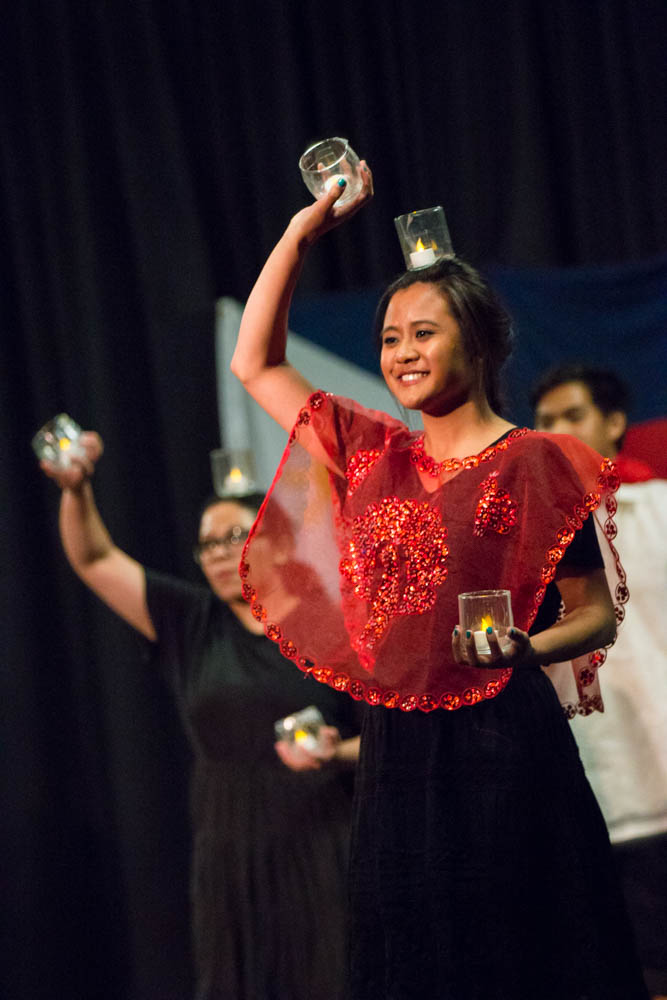Maharlika, Biola’s Filipino club, expressed the excitement and joy in their community during Philippines Culture Night on April 15. The event featured a worship band, a skit, traditional dances and food catered by Island Flavor Filipino Cuisine. Each part of the night sought to teach Biola about the experiences and culture of the Filipino community.
Kind and Supportive Body
“Maharlika” is a Tagalog word meaning “royalty,” and the club seeks to bring a loving fellowship of Filipino culture onto campus. They host cultural events as well as a monthly Bible study and a weekly men’s Bible study. Most of all, they seek to foster a kind and supportive body of Christ.
The night started with a prayer and a beautiful rendition of the Filipino national anthem. The worship team then led the audience in worship, singing familiar songs in both English and Tagalog. Two hosts made transitions between each act, bringing light-hearted puns and jokes to create a casual and welcoming mood.
The Story of the Second Generation
PCN’s humorous skit told the story of a second-generation Filipino boy during his first year at Biola. The main character, Joseph, initially wants to deny his parents’ culture and beliefs in favor of partying — he only joins Maharlika to meet a cute girl. However, he soon grows to understand the value of his family, friendships and faith when he tries to change for the better.
The skit included many laughs, including friendly jabs and inside jokes about Filipino culture and Biola student life. However, the play conveyed an uplifting message about the benefit of positive communities and Christ-centered relationships.
“My prayer was that we could share Filipino culture with the community and glorify God through it all… but we also wanted to help lead the audience, and also the participants, towards Christ,” said Matthew Camacho, sophomore nursing major and co-president of Maharlika. “We try to be as Christ-centered as possible.”
Traditional Filipino Dances
Between each act of the skit, dancers performed a variety of traditional and folk Filipino dances. The first dance was Pandanggo Sa Ilaw, a dance of lights using candles, which required skillful balance. Second was Bangko, a jumping dance with stacked benches, which embodied quickness and dexterity. Next was Singkil, a dance including hand fans and synchronized movements. The final dance was Tinikling, which involved several dancers tapping bamboo poles together for the other dancers to step over in time. Each routine required a lot of skill — through the difficult moves, the dancers proudly displayed their passion for their culture.
Planning for PCN started during the fall semester, as students formed groups and began to prepare through the spring semester. Teams were needed for food, ticket sales, dances, worship and the skit, and many students took on dual roles.
“It was really difficult to have a time where everyone could meet, but we pulled through and made time for it. We grew together in our stress and working hard,” said Justine Reyes, junior communication sciences and disorders major.
Bonding
Although practices were strenuous and it was hard to accommodate the schedules of nearly 40 participants, members were able to bond through their work.
“The lack of sleep and the energy we did have… suffering through it together helped us feel like we were all in the same boat,” said Martin Cruz, sophomore communications major. “Just because we’re all here together, it makes us feel a little bit better. [We] realize, in the end, what we’re showcasing will be so much more satisfying.”
The relationships fostered among the community were not limited to PCN preparation, however. Students in Maharlika agree the club itself provides a safe and fun place to express themselves through a common culture.
“I really like how Maharlika is like my second family here,” Reyes said. “It was really easy to walk in and feel really accepted, everyone’s warm and loving. They’re very inviting; it doesn’t ever feel like anyone’s left out.”
All are Welcome
Membership is not limited to those of Filipino descent — in fact, students of all races and backgrounds are encouraged to attend and learn more about the Philippines.
“Filipinos are loving in general, and we’d love to have anyone,” said David Dionson, freshman kinesiology major. “It doesn’t matter which color, which race you are, we just accept people as they are. We just want to teach people about Filipino culture and what we’re all about.”







